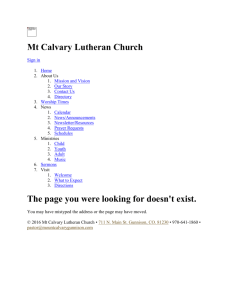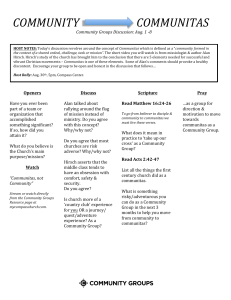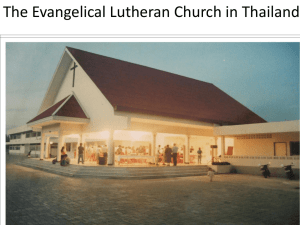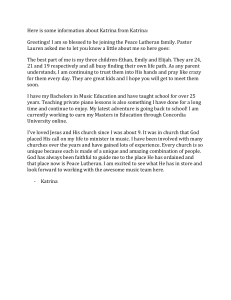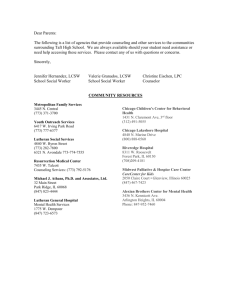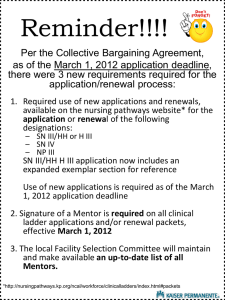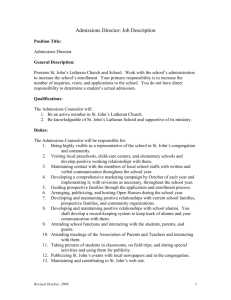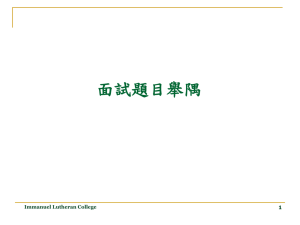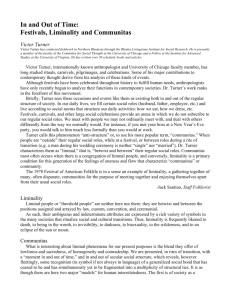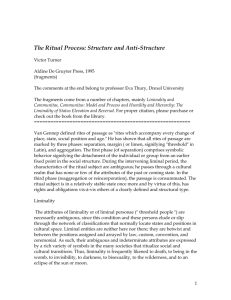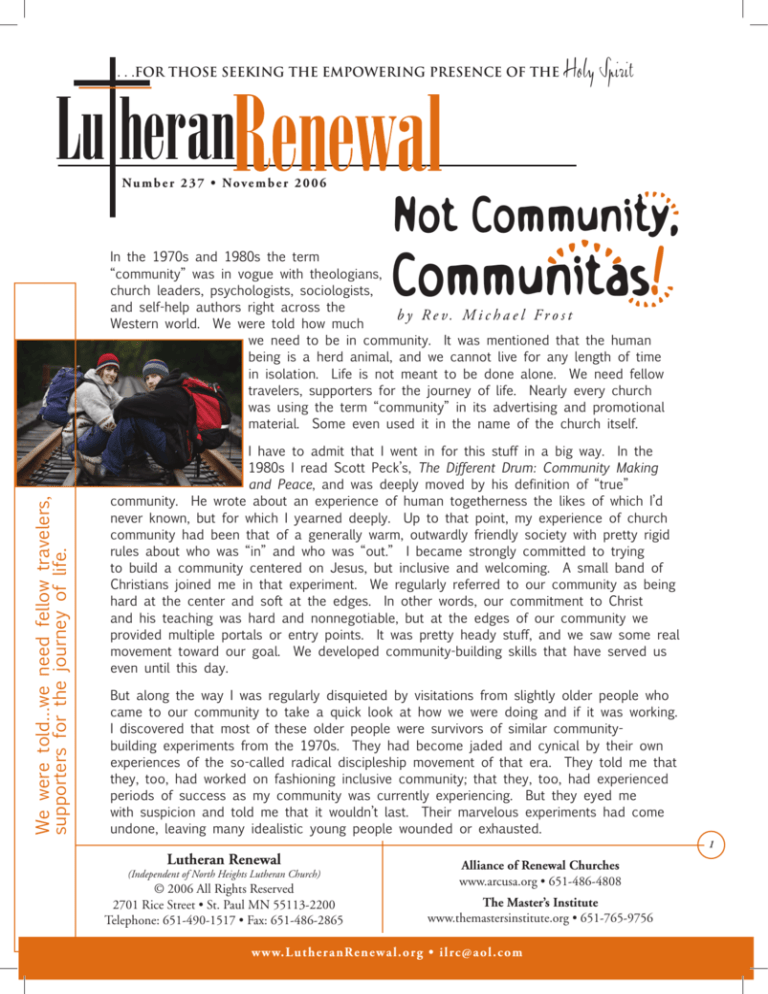
. . .For Those Seeking the Empowering Presence of the
Nu m b e r 2 3 7 • No ve m b e r 2 0 0 6
Holy Spirit
Not Community,
Communitas!
We were told…we need fellow travelers,
supporters for the journey of life.
In the 1970s and 1980s the term
“community” was in vogue with theologians,
church leaders, psychologists, sociologists,
and self-help authors right across the
b y R e v. M i c h a e l F r o s t
Western world. We were told how much
we need to be in community. It was mentioned that the human
being is a herd animal, and we cannot live for any length of time
in isolation. Life is not meant to be done alone. We need fellow
travelers, supporters for the journey of life. Nearly every church
was using the term “community” in its advertising and promotional
material. Some even used it in the name of the church itself.
I have to admit that I went in for this stuff in a big way. In the
1980s I read Scott Peck’s, The Different Drum: Community Making
and Peace, and was deeply moved by his definition of “true”
community. He wrote about an experience of human togetherness the likes of which I’d
never known, but for which I yearned deeply. Up to that point, my experience of church
community had been that of a generally warm, outwardly friendly society with pretty rigid
rules about who was “in” and who was “out.” I became strongly committed to trying
to build a community centered on Jesus, but inclusive and welcoming. A small band of
Christians joined me in that experiment. We regularly referred to our community as being
hard at the center and soft at the edges. In other words, our commitment to Christ
and his teaching was hard and nonnegotiable, but at the edges of our community we
provided multiple portals or entry points. It was pretty heady stuff, and we saw some real
movement toward our goal. We developed community-building skills that have served us
even until this day.
But along the way I was regularly disquieted by visitations from slightly older people who
came to our community to take a quick look at how we were doing and if it was working.
I discovered that most of these older people were survivors of similar communitybuilding experiments from the 1970s. They had become jaded and cynical by their own
experiences of the so-called radical discipleship movement of that era. They told me that
they, too, had worked on fashioning inclusive community; that they, too, had experienced
periods of success as my community was currently experiencing. But they eyed me
with suspicion and told me that it wouldn’t last. Their marvelous experiments had come
undone, leaving many idealistic young people wounded or exhausted.
Lutheran Renewal
(Independent of North Heights Lutheran Church)
© 2006 All Rights Reserved
2701 Rice Street • St. Paul MN 55113-2200
Telephone: 651-490-1517 • Fax: 651-486-2865
Alliance of Renewal Churches
www.arcusa.org • 651-486-4808
The Master’s Institute
www.themastersinstitute.org • 651-765-9756
www.Lu t h e r a n Re n e w a l . o r g • i l rc @ a o l . c o m
1
So I went back to study the Acts of the Apostles, and I realized that the blissful early
days of the Jerusalem church were also short lived. In fact, I realized that the inclusivity
of sharing possessions, eating together, and gathering under the apostles’ teaching, as
delicious as it seemed, was actually a contravention of Jesus’ command for them to
take the gospel to the very ends of the earth. As I read on, I realized that the early
Jerusalem church was in fact a community in transition. Once a traveling missionary
community of disciples, centered on Jesus, it had become a static group, camped in
Jerusalem. But this was not its intended future. After the persecution that resulted
from Stephen’s bold and offensive ministry (Acts 6-7), the church was scattered, and
through that dispersion it rediscovered its original mandate: to be a missionary people, a
community on the move.
I began to fear that we had lost something important in all our work in building
community. I began to wonder whether Christians don’t do well to build community as
an end in itself. We build community incidentally, when our imaginations and energies
are captured by a higher, even nobler cause. Though it took me a while, I came to
realize that Christian community results from the greater cause of Christian mission. My
ongoing reading led me to discover that what I was originally yearning for was not the
therapeutic community that Scott Peck wrote about, but rather the missionary community
that the apostle Paul writes about.
I have come to realize that aiming for community is a bit like aiming for happiness. It’s
not a goal in itself. We find happiness as an incidental by-product of pursuing love,
justice, hospitality, and generosity. When you aim for happiness, you are bound to miss
it. Likewise with community. It’s not our goal. It emerges as a by-product of pursuing
something else. Those who love community destroy it, but those who love people build
community.
Then my dear friend and fellow conspirator, Alan Hirsch, with whom I wrote, The Shaping
of Things to Come, introduced me to the much more radical concept of “communitas.”
Anthropologist Victor Turner first used the term communitas in his 1969 book, The Ritual
Process. Turner explored the nature of male initiation rites among the Ndembu, a tribe
in Zambia. He and other anthropologists identified three universal stages to such rites:
separation, liminality, and reintegration.
Young men of a certain age were removed
from mainstream society while they undertook
the ordeal of induction into adult life. This
period of separation, during which the initiates
were considered no longer children but not yet
adults, was called liminality.
A liminal state is
a stage of transition, a period that is neither
one thing nor the other. Cast out of the
village and made to live in the jungle, fending
for themselves, the initiates were visited
regularly by the community’s holy men to be
taught the lore and learning of adulthood.
After a prolonged period of liminality, the
young men were then reintegrated into mainstream or normal society with a new status.
They were men in full standing, no longer boys living in the world of women. But most
interesting, was that being in this liminal or “limbo” stage, the initiates discovered a depth
of community so great that it transcended what we normally mean by that term. This is
communitas.
Lutheran Renewal
w
l
Although this anthropology may seem somewhat obscure, the concept of communitas isn’t
as unusual as it first appears. We all know that when people are thrown into a challenge,
an ordeal, they develop a much deeper sense of communion. Think of any group of
people in a liminal state, and in all likelihood they will have experienced a deeper sense
of community than those in mainstream society.
Have you ever been on a short-term mission trip overseas and felt such a special,
intimate, profound sense of connection with your fellow travelers?
When building houses
in Mexico or working in orphanages in Haiti, we connect with other Christians at a level
entirely different from the one experienced each week in our local church. This isn’t
just because of the exotic location or the spicy food. It’s because we are in a liminal
state. We are not living at home, nor are we really living in Mexico. We are in transition,
a resident in neither place, really. This sense of liminality, fueled by the challenge of
completing certain tasks, fosters communitas. Even if we find
ourselves on a team with people we don’t particularly enjoy,
…the experience
the experience of liminality eventually sweeps away our petty
of limi nality
differences, bonding us strongly, because we are forced to rely on
eventually sweeps
each other simply for survival.
This is obviously the sense of companionship that Jesus’ first
disciples felt. With Jesus at the center, they experienced a
liminality and communitas so exquisite that it eventually spoke
so profoundly into normal, mainstream society that it altered the
history of the world forever. Although we sometimes mistakenly
imagine the company of Jesus to be a happy band of vagabonds
traveling carefree around Palestine, we need to remember that
the twelve apostles, in particular, had left everything to follow
Jesus. They were like the African initiates. They had separated
themselves from mainstream society at great personal cost. They
are a perfect example of a liminal society.
away our petty
differences,
bonding us
strongly, because
we are forced
to rely on each
other simply for
survival.
a
My quest in the 1980s and 1990s to build true community was only slightly misguided.
The hunger for community is a legitimate one, but to pursue it for its own sake is the
mistake. When we seek to build community without the experience of liminality, all we
end up with is the kind of pseudo-community that pervades many churches. It’s more like
a support group than a communitas.
Community Communitas Inward focus
Social togetherness outside ‘society’
Focus on encouraging each other
Focus on the task at hand
Safe place
Pushes ‘society’ forward
Something to be built
Experienced through liminality
Communitas is so different from what we have usually identified as “community”,
particularly the way the church has used this term. So-called Christian community often
is portrayed as an inwardly focused gathering of people committed to one another, to
encouraging one another and building one another up. It is often referred to as a “safe
place”; a place where members can be open and vulnerable together and receive support,
understanding, and mutual care. I have no objection to these things at all. In fact, I
hunger for them. But I think that the church has made them an end in themselves. We
are regularly told to “build” community, to meet new people, to welcome visitors, as if
this is our purpose as a church. Community is not an end in itself; rather, it is a means
w w w. L u t h e r a n R e n e w a l . o r g
to an end. Initiates, experiencing communitas, might find all the elements of mutual
support and care mentioned above, but they find them as part of a group of people
undergoing a shared ordeal. In other words, you can’t have the marvelous experience
of communitas without being in a liminal state. Many churches want the experience of
rich, deep relationships, but they aren’t prepared to embrace the challenge of coming
out of mainstream society. When in a liminal stage, coping with the difficulties and
ordeal of being outside the structure of normal society, people find themselves thrown
together in a richer, deeper, more powerful sense of togetherness. Not community,
communitas!
Building community for its own sake is like attending a cancer support group without
having cancer. It’s like asking soldiers you haven’t fought with to imagine that you
are their captain. And it’s like your church demanding your allegiance and your
weekly attendance without giving you a cause to work toward. It’s no different to
the church holding endless Bible study groups or hearing countless sermons for the
purpose of learning information that will be rarely utilized. Have you ever noticed
how many men attend worship only occasionally and begrudgingly, but when there’s
a church cleanup day, they’ll turn up joyfully and work hard
all day? Such workdays create a mini-communitas. So do
short-term mission trips and youth mission trips. So does
church planting. But weekly church services do not. It’s like
sitting at the apostles’ feet and drinking in the teaching in
Jerusalem in the first century. It serves a useful purpose
but the ultimate purpose of the Jerusalem church was to
go and make disciples of all nations. There’s no question
that the apostles’ teaching was essential, but not as an end
in itself. Their teaching was meant to mobilize ordinary
believers to go into the world, baptizing new disciples and teaching them all that
Christ commanded them. As, we noted earlier, it wasn’t until persecution drove the
first Christians out of Jerusalem that they discovered their purpose and that purpose
threw them together into a liminal state as a missionary movement.
Michael will be
speaking, along
with Graham
Cooke, at our
February 9-10,
2007 Equipping
Conference,
“A Prophetic
Life with God,
A Prophetic
Lifestyle in the
World.”
P l e a se see the
e n c losed brochure.
Attending a respectable middle-class church in a respectable middleclass neighborhood isn’t a liminal experience. Joining a peace
movement in a nation obsessed with military might is. Traveling to
Indonesia to help with the international relief effort after a tsunami is.
Joining a church-planting team is. Why do our churches often miss
this experience of communitas? For no other reason than that they
often avoid liminality, opting for a safer, more secure environment.
I’m not for a minute suggesting that Christian communitas shouldn’t
address the need that all of us have for safety. Indeed it should.
However, it should fashion safe spaces not as alternative to missional
engagement in our world, but as parallel experiences to that
engagement. Whenever I have led or been part of a mission team,
we have ensured that there are protocols for those who are tired,
emotionally depleted, or spiritually dry to retreat and be replenished.
But this hasn’t stopped the mission from continuing. It happens in
parallel with the ongoing purpose of the team.
This article was adapted from Exiles: Living Missionally in a Post-Christian
Culture by Michael Frost, copyright 2006, by Hendrickson Publishers,
Peabody, Massachusetts. Used by permission. All rights reserved.
Lutheran Renewal
L to
leade
leade
w
l
Pastor Mark Marxhausen will be traveling to Papua New Guinea (PNG)
in November 2006. Mark has developed a close relationship with the
Lutheran renewal group there, having visited on seven previous
occasions. The flight is very expensive, and may be more
than $3,000. If you would like to help with the
expenses associated with this trip, please send
your gift to Lutheran Renewal with a
note expressing your desire to
help support the mission
to PNG.
Thank
you!
On the
Road
with
PAUL(Anderson)
Scandinavia. Arlen and Elsa Salte from Breakforth! Canada, Nate Johnstone and
Andrew Anderson (MI grads and church planters) and I traveled to Scandinavia
and Latvia in late September after I had gone alone to Brazil earlier that month. We
led a conference in Bergen, met with pastors in Sweden, made plans in Latvia for a
Lutheran Renewal Leaders’ Conference next October, met with Christians in the Latvian
Parliament, then participated in the Nokia Mission and spoke at a pastors’ conference.
Brazil. This month the fifty churches that have left the Lutheran Church of Brazil
will form a new network. I have been with them twice, once when they were still in the
Lutheran Church and in September at a conference after they had left. They are happy to
be released from the restraints of an oppressive system, and they have asked me to return in
the spring for a pastors’ conference. They also plan to have Mike Bradley come down and help
them plant a leadership training school, perhaps a Master’s Institute.
Finland. Markku Koivisto, the leader of the Nokia Mission which Lutheran Renewal has
connected with, has been given five months to recant on ten issues for which he is being tried
for heresy. He is not a heretic; he is a gifted leader of a powerful movement that is spreading
in Finland. They planted a Master’s Institute Finland two years ago. Church leaders would like
Markku to leave, but he has been encouraged to stay and fight it out. There is no doubt that there
are many Nicodemus types who are silently rooting for him. I will be meeting with his staff next
spring to speak to them about the ARC.
Sweden. Drew Shepp, one of the leaders of our
young adult ministry, and I participated in the
Swedish form of the Holy Spirit Conference last July,
attended by 2,000 participants. I will be returning in the
spring to spend more time with the leaders and to have a
rally in Gothenburg.
Norway. We recently held a Breakforth! Norway conference
in Bergen. The church where we met is under the leadership
of Reidar Paulson, who also leads the Doulos network of about
eight churches. I will be spending a weekend next spring with this
network, which is connected to the ARC. I will also be checking
out the conference center of a friend, Dr. Asbjorn Simonnes,
L to R: Nate Johnstone, Andrew Anderson, Paul Anderson, Hans Weibrocht,
concerning a joint venture.
leader of Swedish Lutheran renewal network, and Elsa and Arlen Salte, worship
leaders and founders of the Breakforth! conferences.
w w w. L u t h e r a n R e n e w a l . o r g
505051194
Lutheran Renewal
w
l
BG aA p t i sG m
od’s
ctivity of
Hearing God
race
By Kent Groethe
B y M o r r i s Va a g e n e s
Dr. Morris Vaagenes, Pastor Emeritus of North
Heights Lutheran church and one of the
founders of Lutheran Renewal, has written an
excellent book on the subject of baptism. This
book answers questions such as, “What is the meaning of baptism?”
“Why is baptism important?” “What are the areas of agreement and
disagreement?” “Is baptism a passport to heaven?” There are questions
for discussion at the end of each chapter which make this book an
excellent resource for an adult study class or to prepare sponsors.
Dr. Roy Harrisville, Professor Emeritus at Luther Seminary, has this
to say about Pastor Morris’ book: “The author engages the ordinary
reader, who may be uninitiated in the complexities of theological
debate, in the Christian teaching on Baptism. He focuses on the Bible
alone, without attention to particular doctrinal viewpoints.”
Please see the back page to order you r c o py o f t h i s b o o k .
Equipping
Conference
With Graham Cooke
and Michael Frost
God is speaking to us
constantly in order to guide
us, lead us into more effective service to others, and
to show His great love for
us. Pastor Kent Groethe looks at eighteen
ways in which God speaks to us today. He
explores reasons why we often miss His communications and gives suggestions as to how
we can better hear Him. Please contact Pastor
Kent to order your copy of this book. His e-mail
address: biblealiveministries.@yahoo.com.
A
IC
P R O P H EGTod­
Life With —
A
PROPHETIC
Lifestyle e ld
in th Wor
February 9-10, 2007
Location:
Arden Hills, MN
M
M
Muuulltlttiip
ippllylyyi in
innggg YYYooouuurrr FFFi ininnaaannnccci iaiaal ll GGGi ififtftstss
In our February 2006 newsletter we let you know of the ”GivingPlus” program through which
Thrivent Financial matches your donations to Lutheran Renewal at a 1:2 ratio. Thrivent will
contribute $1 for every $2 you donate to Lutheran Renewal, for a maximum of $300 per year
from Thrivent. So, if you give LR $600, Thrivent will contribute an extra $300 to our ministry.
Your $600 has increased to a $900 gift. What an added blessing to Lutheran Renewal! We
so appreciate the year-end gifts that many of you donate to us at this time of year, and we
wanted to remind you of this special program before the year ends.
This program is open to anyone who is currently a Thrivent member, and to make it easier
for you, you’ll find the “Member Gift Form” on page 6 of this newsletter. If you choose to give
to Lutheran Renewal, and if you’re a member of Thrivent, please fill in the enclosed “Member
Gift Form,” and send it along with your next donation.
If you’re not a member of Thrivent, you may still take advantage of this program. Contact
Lutheran Renewal by phone or e-mail and we’ll send you an Associate Membership Application.
You may also download this form from our website. There is a $10 fee to become an
associate member. The associate membership must be renewed each year.
Thank you for taking the extra time to do this paperwork. We appreciate your generosity!
w w w. L u t h e r a n R e n e w a l . o r g
NEW! • NEW!
R E S O U R C E S
Baptism, God’s Activity of Grace
Dr. Morris Vaagenes answers questions such as,
“What is the meaning of baptism?” “Why is baptism
important?” “What are the areas of agreement and
disagreement?” “Is baptism a passport to heaven?”
There are questions for discussion at the end of each
chapter which make this book an excellent resource
for an adult study class or to prepare baptism
sponsors. ($16)
Answering Your Questions About Speaking in
Tongues Larry Christenson has re-released this helpful
book, now with a new preface, that has already sold over
250,000 copies. He addresses questions like: “Is the gift of
tongues for today?” “What does speaking in tongues mean?”
“Is speaking in tongues for me?” and many more. ($8)
Breaking Strongholds in My Life
Prayer Ministry (Expanded)
A booklet by Paul Anderson with practical help in training
prayer ministers. Twice the size of the original. ($3)
Pray For the Power of the Spirit (Tract)
By Rev. Del Rossin, a biblical study on releasing the power
of the Holy Spirit. (6/$1 or 100/$15)
The Renewed Mind
This book by Larry Christenson touches on five major areas
of spiritual experience: Dependence on God; Facing challenges
with the authority of Christ; Patience; Discipline; Prayer. ($9)
Ride the River
Using a parable of Lewis and Clark’s exploration of the
American West, Larry Christenson helps you discover
how God the Father puts your life journey under the coleadership of Jesus Christ and the Holy Spirit. ($11)
A booklet by Paul Anderson that identifies key strongholds of bondage in our lives and how we can break free
through the power of the Spirit and not merely by our
own effort. ($2)
A Soldier Looks at Spiritual Warfare
Building Christian Character
What About Baptism? (Booklet)
A practical 17-page booklet by Larry Christenson. Topics
include: Infant Baptism, Immersion, Re-baptism and Baptism
with the Holy Spirit. ($2.25)
An inspiring and challenging study by Paul Anderson of
34 Christian character traits. The study gives a biblical
meaning and example of each trait and shows how the
trait can be applied in practical ways. (Workbook or
Teacher’s Guide: $6 each, 8 or more $5 each)
You Shall Be Baptized in the Holy Spirit
Dare to Dream Do you want to discover your dream? Learn how to
pursue it? Need to recover broken dreams? In Dare to
Dream, Paul Anderson will help you to discover what God
has placed inside of you! ($10)
Dare to Dream Workbook
This journaling book by Paul Anderson will assist you in
creating the kind of climate in which God-sized dreams
can grow. Each page has a Dream Reflection and
accompanying questions. ($6)
Dare to Dream and Workbook Set ($14)
Especially for Pastors
The Father’s Gift
Paul Anderson has written a book that answers many of
your questions about the Holy Spirit. Are you wondering
about the gifts? Would you like to be filled with the Spirit?
Can the Spirit really lead us? Questions at the end of each
chapter make it great for a Bible study group, Sunday
School class, or for personal reflection. ($10)
A biblical study of this spiritual gift by Larry Christenson.
He also traces its connection with receiving the Holy Spirit,
answers questions, covers theological concerns, and
discusses practical aspects. ($2.25)
Gospel Stories
Pastor Orval Moren has written a powerful resource for
anyone who would like a “3-minute lesson” for children.
You’ll also find suggestions, visual aids and Scriptural
references in this indispensable tool. ($12 $7)
Healing From a Father Wound (Booklet)
A message by Paul Anderson that brings emotional and
spiritual healing to those who carry wounds from the
past. ($2)
Lutheran Renewal
This book, written by Elsie Fuhrman, teaches believers how
to receive empowerment of the Spirit and how to minister
it to others. ($7)
Title
Quantity (payment enclosed)
____________________________ ________ $____________
____________________________ ________ $____________
____________________________ ________ $____________
____________________________ ________ $____________
Merchandise Total $____________
Merchandise
Edited by Paul Anderson, a monthly newsletter to encourage
and assist pastors as they shepherd the Lord’s flock. ($20
annually for hard copy or $10 annually for e-mail. Include
e-mail address on order form.)
The Gift of Tongues (Booklet)
Author Dick Denny uses military analogies to confront
readers with the reality of spiritual warfare. “Superb” said
one longtime adult educator. ($15)
Shipping
$ 1-$ 5.99
$2.00
$ 6-$ 9.99
$3.00 (not necessary $____________
$10-$19.99
$4.00
(shipping)
for tracts)
$20+
$5.00
(Outside the U.S. add $2.00 to each postage category)
Merchandise plus Shipping Total $____________
(sub-total)
(tax)
U.S. Funds
(Minnesota residents add 6.5% sales tax)
$____________
TOTAL $____________
Payment Information
q Check
q VISA
q MasterCard
_____________________________________
Credit Card Number ____________
Expiration Date
_______________________________________________________
Signature (required for card orders) Name_______________________________________________
Address_____________________________________________
City_________________________________________________
State ________________________ Zip __________________
Phone_______________________________________________
E-mail_______________________________________________
Return to LR: 2701 N. Rice Street; St. Paul, MN 55113
w w w. L u t h e r a n R e n e w a l . o r g

